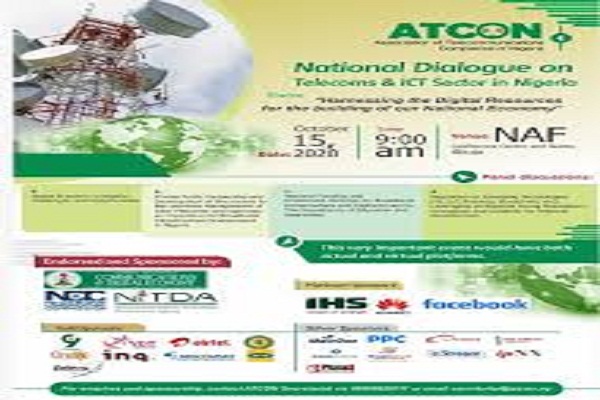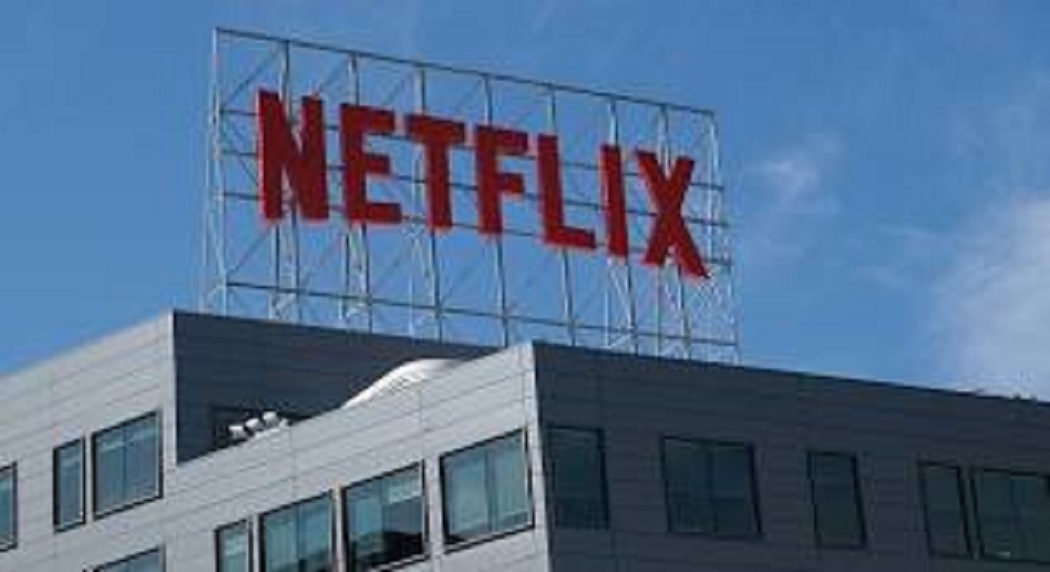Telecom
ATCON Reaffirms Date for National Dialogue on telecoms and ICT

The Association of Telecommunications Companies of Nigeria (ATCON) has enjoined its entire stakeholders to take note of the new date for the National Dialogue on Telecommunications and ICT Sector in Nigeria.
The event which has a well-researched theme “Harnessing the Digital Resources for the building of our National Economy” will now hold on Thursday, October 15, 2020 at NAF Conference Centre Abuja.
Speaking in a statement released on Monday, Olusola Teniola, President, ATCON, said that the event is positioned to grow the entire sector of the Nigerian economy exponentially as thought leaders are expected to come up with brilliant ideas as to what the public and private sector can do to maximize the benefits inherent in the digital economy such that the recent fall in Nigeria’s GDP can be reversed.
The recent Index of Digital Quality of Life positioned Nigeria in the pursuit of digital economy and ranked as 20th position at the beginning of the survey (Nigeria is currently ranked 81st).
“We are pleased to announce the confirmation of the following very important personalities to grace the event: Dr Isa Ali Ibrahim Pantami, Honourable Minister, Federal Ministry of Communications and Digital Economy; Rt. Hon. (Dr.) Simon Bako Lalong, Executive Governor, Plateau State; Prof Umar Garba Danbatta, EVC/CEO, Nigerian Communications Commission (NCC); Mr Kashifu Inuwa Abdullahi, Director-General/CEO, National Information Technology Development Agency (NITDA); Mr Shubham Chaudhuri, Country Director (Nigeria), World Bank; Mr Segun Ogunsanya, Managing Director/CEO, Airtel Networks; Mr Alan Sinfield, Managing Director/CEO, 9mobile; Mr Trevor Liuyan, CEO, Huawei Nigeria and many others.
“This National Dialogue on Telecoms and ICT is targeted at changing the structure of the country’s development through the maximum utilization of digital resources such that Federal Government, State Government and other key stakeholders in the Agriculture, Education, Oil & Gas, Health, Industry, Trade and Investment, Security and Defence Sector would leverage on the outcome of this event to improve their contributions to the nation’s GDP.
“The preposition above is based on effective collaboration amongst the different sectors of the economy as we all know that collaboration is the new competition.
“The supply side which is comprised of Telecom and ICT Companies and the demand side which is made up of all the Ministries, States, Local Governments, Nigerians and Non-Nigerians are expected to have higher level of productivity on the condition that they adopt and leverage on the opportunities presented by the digital economy to improve their output. This strategic dialogue plans to bring together the Presidency, National Assembly, relevant Federal Ministries, State Governors, ICT State Commissioners, Telecom and ICT Operating Companies, World Bank and other international relevant agencies”, ATCON said.
The underlining strategic objectives of the proposed National Dialogue are as follows:
To intentionally channel collaborative positive efforts toward Nigerian Digital Economy with the sole aim of accelerating our economy’s performance in relation to other leading African countries
To serve as a forum to discuss the recently launched documents on Digital Economy and take stakeholders input for implementation.
To optimally X-ray the factors that have worked for and against the telecom and ICT sector in Nigeria.
To discuss regulations and policies around AI, IoTS and Blockchain and the rest.
Thought leaders in the industry have been invited to do justice to the following panel sessions:
Digital Economy in Nigeria: Challenges and Opportunities
Private Public Partnership and Development of Mechanism for the seamless Management of Inter-Ministries and Agencies: an imperative for Broadband Infrastructure Development in Nigeria
National Funding and Investment Strategy for Broadband Infrastructure and Digital Economy: The Importance of Education and Awareness
Regulation on Emerging Technologies (AI, IoT, Robotics, Blockchain, etc): Leveraging on Nigerian Young Population’s Innovation and Creativity for National Development
learned that there shall be a special sectoral discussion tagged “Harnessing Digital Resources for Sectoral Effectiveness and Efficiency for National Development”
The special session discussants are:
Mallam Adamu Adamu, Honourable Minister, Federal Ministry of Education
Dr Osagie Ehanire, Honourable Minister, Federal Ministry of Health
Alhaji Mohammed Sabo Nanono, Honourable Minister, Federal Ministry of Agriculture and Rural Development
Major General Bashir Salihi Magashi (Rtd), Honourable Minister, Federal Ministry of Defence
Chief Timipre Sylva, Honourable Minister of State, Federal Ministry of Petroleum Resources
Otunba Richard Adeniyi Adebayo CON, Honourable Minister, Federal Ministry of Industry, Trade and Investment
Alhaji Muhammad Musa Bello, Honourable Minister, Federal Capital Territory Administration
Mr Rotimi Ameachi, Honourable Minister, Federal Ministry of Transportation
Mr Babatunde Raji Fashola, Honourable Minister, Federal Ministry of Works and Housing
“One of the overriding deliverables of this national dialogue on telecoms and ICT sector is that the adoption of digital resources by all aforementioned sectors would lead to development which would eventually make Nigeria to join the league of the top 20 global economies”, the statement concludes.
Telecom
MTN Nigeria Unveils CPaaS Platform to Transform Business Communication

At the recently concluded NextNow Business Forum in Victoria Island, MTN Nigeria electrified the business community with a live demonstration of its forthcoming Communication Platform as a Service (CPaaS), a solution engineered to redefine how Nigerian enterprises connect with their customers.

Unlike traditional communication systems, MTN’s CPaaS is built for the realities of a mobile-first market. The platform unifies SMS, voice, WhatsApp, email, and more into a single, intuitive interface. This approach is especially significant in Nigeria, with over 107 million internet users, 45.4% of the total population, according to Data Report. This figure underscores the necessity for businesses to meet customers where they are.
During the demo, attendees witnessed how CPaaS enables two-way, real-time conversations between brands and customers. The platform’s support for rich media, instant analytics, and seamless integration with business workflows drew particular attention. These features are designed to empower businesses with data-driven insights and the agility to personalise every interaction, whether it’s a service notification, marketing campaign, or customer support exchange.
Akinbulejo Onabolu, Head of Enterprise Segment at MTN Nigeria, articulated the vision: “CPaaS gives enterprises the flexibility to interact with their customers on their preferred platforms; whether it’s chat, voice, or messaging, in a way that feels personal and immediate. We’re looking forward to the value this will unlock for businesses across industries once it launches.”
The fireside chat added depth to the conversation, with Omowunmi Olatunbosun, Head of SME Segment at MTN Nigeria, and Stephen Agbi of Bayobab, highlighting how digital engagement bridges the gap between businesses and audiences.
They emphasised that today’s consumers demand immediacy, relevance, and ease, qualities that CPaaS is built to deliver.
The stakes for digital transformation in Nigeria are high. In a report by Punch, the country’s enterprise tech market is projected to reach $22 billion by 2027, reflecting a surge in demand for scalable, cloud-based solutions that drive efficiency and customer loyalty.
The CPAAS Acceleration Alliance have estimated that globally, the CPaaS market is expected to grow from $14.7 billion in 2025 to $72.4 billion by 2035, at a compound annual growth rate of 18.4%, a testament to the platform’s transformative potential.
The event’s closing keynote from META’s Korhan Yunak reinforced the strategic value of digital channels like WhatsApp, which are now indispensable for business communication and engagement at scale.
As MTN Nigeria prepares for the Q3 2025 launch, the anticipation is unmistakable. With its promise of flexibility, intelligence, and seamless integration, MTN’s CPaaS platform is set to become the backbone of next-generation business-customer engagement in Nigeria, enabling enterprises to not just communicate but to connect, adapt, and grow in a digital-first era.
Telecom
MTN Mulls Establishment of Fintech Firm in Nigeria, Others

MTN Uganda is seeking input from stakeholders on a plan to structurally separate its mobile money service, MoMo, from its core telecoms business.

According to the company, the proposed change will be discussed at the upcoming extraordinary general meeting on July 2.
If approved, the telco’s fintech business will be run by a new company controlled by MTN Group Fintech Holdings B.V. and a trust benefiting minority shareholders following a merger.
Additionally, the restructuring also aligns with MTN Group’s ambition 2025 strategy which aims to unlock value, attract new investors, and strengthen regulatory compliance by creating standalone fintech entities in Uganda, Ghana, and Nigeria.
The company’s fintech division has over 13 million customers, with an 18.4% revenue increase in the first quarter of 2025, driven by 19.0% growth in mobile money services, 19.8% growth in transaction volumes, and a 31.4% increase in transaction value.
Reports say the decision is part of the telco’s compliance with the National Payment Systems Act 2020, which mandates mobile money businesses to operate as standalone entities, and to align with MTN Group’s regional fintech strategy.
MTN Uganda, which is led by CEO Sylvia Mulinge, highlighted that the implementation of the proposed transaction will be subjected to a number of conditions and regulatory procedures.
“The implementation of the proposed transaction shall be subject to a number of conditions, including the company and MTN MoMo receiving all required regulatory approvals and no-objections and complying with any regulatory conditions,” said MTN Uganda in notice.
Telecom
Netflix Expands European Presence with €1 Billion Investment in Spain

Netflix has announced plans to invest more than €1 billion in Spanish film and television productions over the next four years, reinforcing its commitment to Spain as a key creative hub in Europe.

The announcement was made by co-chief executive Ted Sarandos at an event held at Netflix’s production studios near Madrid, celebrating the company’s 10-year presence in the country.
Sarandos emphasized that the investment would contribute significantly to Spain’s economy, create jobs, and enable the streaming platform to produce more local content. He was joined by Spanish Prime Minister Pedro Sánchez in unveiling the initiative.
Netflix first established its international production studios in Madrid in 2019, following the success of the Spanish-language hit series Money Heist.
Since then, its 22,000-square-meter facility has become one of Netflix’s major production centers within the European Union.
The company currently supports over 20,000 jobs in Spain, highlighting the nation’s growing influence in global entertainment.
The investment reflects Netflix’s ongoing strategy to expand its presence in European markets through original content and local talent.

 General News2 days ago
General News2 days agoAfDB to Provide $184.1mfor Africa’s Largest Solar Energy, Battery Storage Project

 News2 days ago
News2 days agoReport Reveals New Malware Posing as an AI Assistant Steals User Data

 General News2 days ago
General News2 days agoCourt Declines Access Bank’s Request to Freeze MTNN Account over N180Bn Claims

 Telecom2 days ago
Telecom2 days agoMTN Mulls Establishment of Fintech Firm in Nigeria, Others

 E-Business2 days ago
E-Business2 days agoFG Mulls Fibre Optic Layout to Bridge Internet Gaps

 News2 days ago
News2 days agoAliko Dangote Signs out @ Dangote Sugar Refinery as Chairman

 E-Financial2 days ago
E-Financial2 days agoFG to Train 100,000 Youths Annually in Forex Trading and Financial Skills

 E-Financial1 day ago
E-Financial1 day agoSterling Bank Pledges ₦2bn to Fully Fund University Scholarships





















